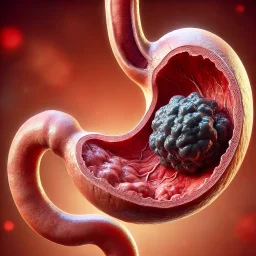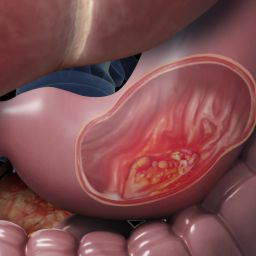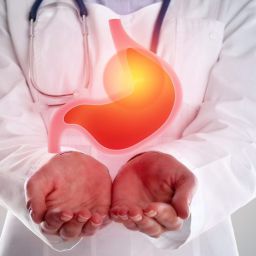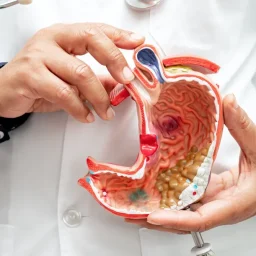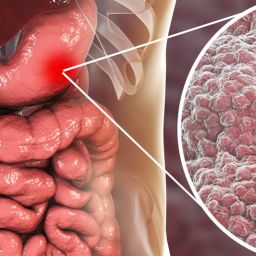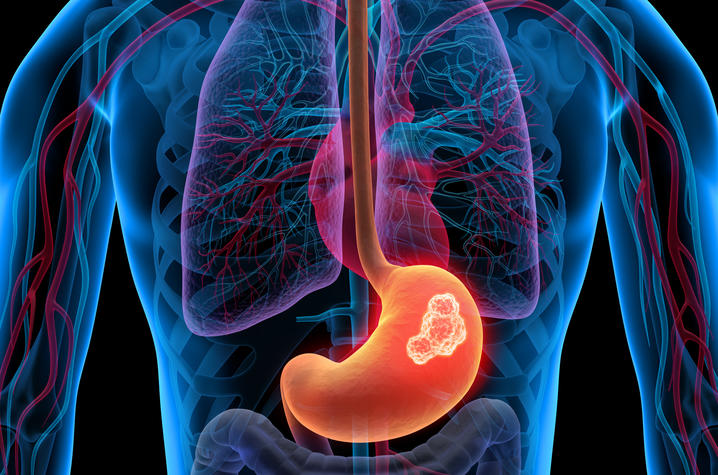
The Causes of Stomach Cancer
Stomach cancer develops when cells in the stomach begin to grow uncontrollably. While the exact cause of stomach cancer is still not fully understood, several factors contribute to its development. These factors include genetic predispositions, lifestyle choices, and environmental influences. Here are some of the most commonly recognized causes and risk factors:
1. Helicobacter pylori Infection
One of the most significant risk factors for stomach cancer is infection with the bacterium Helicobacter pylori (H. pylori). This bacterium is responsible for causing chronic inflammation in the stomach lining, which can lead to ulcers and, over time, increase the risk of cancer. H. pylori infection is prevalent in many parts of the world, particularly in developing countries, and it is believed to be a major contributor to gastric cancer.
2. Genetic Factors
Genetics play a critical role in the development of stomach cancer. People with a family history of the disease are at a higher risk, suggesting a genetic predisposition. Certain inherited genetic conditions, such as hereditary diffuse gastric cancer (HDGC), increase the likelihood of developing this cancer. HDGC is caused by mutations in the CDH1 gene, which is involved in maintaining cell structure and function.
3. Dietary Factors
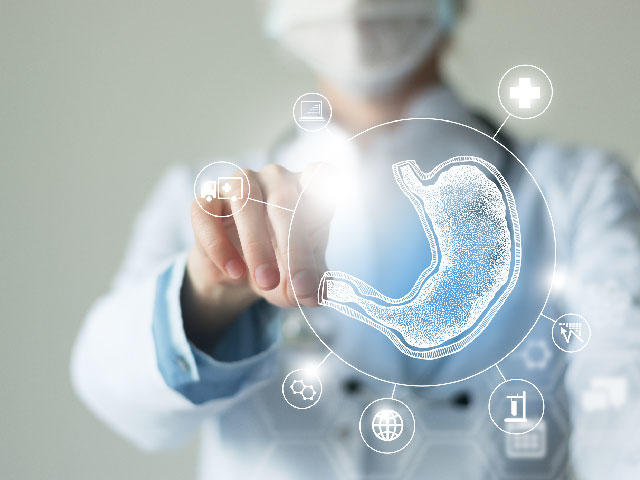
A person’s diet can significantly influence their risk of developing stomach cancer. Diets that are high in salty, smoked, or pickled foods, as well as those rich in nitrates, are associated with an increased risk. The consumption of fresh fruits and vegetables, on the other hand, has been shown to lower the risk of developing gastric cancer, likely due to their antioxidant content, which helps protect cells from damage.
4. Tobacco and Alcohol Use
Both smoking and excessive alcohol consumption are well-established risk factors for stomach cancer. Smoking damages the cells lining the stomach and increases the chances of developing cancer. Alcohol, particularly in large amounts, can irritate the stomach lining and lead to chronic inflammation, which can further increase cancer risk.
5. Age and Gender
Age and gender also play a crucial role in the development of stomach cancer. The risk increases with age, particularly in people over the age of 50. Additionally, men are more likely to develop stomach cancer than women, though the reasons for this disparity are still under investigation.
6. Chronic Gastritis and Stomach Ulcers
Chronic gastritis, which involves long-term inflammation of the stomach lining, is another contributing factor. This condition can weaken the stomach’s protective layer, making it more susceptible to cancer-causing agents. Additionally, peptic ulcers, which are often caused by H. pylori infection, can lead to the development of stomach cancer if left untreated.
Symptoms of Stomach Cancer
The symptoms of stomach cancer often do not appear until the disease has advanced, making early detection challenging. In the early stages, the cancer may not cause any noticeable symptoms. However, as the tumor grows, it may cause the following signs and symptoms:
1. Indigestion or Heartburn
Frequent indigestion or heartburn, particularly if it is persistent and unexplained, can be an early warning sign of stomach cancer. These symptoms are often similar to those caused by less severe conditions, such as gastroesophageal reflux disease (GERD), which can make it difficult to diagnose cancer early.
2. Abdominal Pain and Discomfort
People with stomach cancer may experience vague abdominal pain or discomfort, which may be mistaken for a stomach ache or indigestion. As the cancer progresses, the pain can become more severe and constant, often accompanied by bloating and a feeling of fullness after eating small amounts of food.
3. Nausea and Vomiting
Nausea and vomiting, especially if they are persistent, can be indicative of stomach cancer. These symptoms can occur as the tumor obstructs the stomach, making it difficult for food to pass through the digestive tract. In some cases, vomiting may contain blood or material that looks like coffee grounds, which is a sign of bleeding.
4. Unexplained Weight Loss
Unexplained weight loss is a common symptom of stomach cancer, particularly in the later stages of the disease. Weight loss occurs because the body is not absorbing nutrients properly due to the tumor interfering with digestion. In some cases, patients may experience a loss of appetite, further contributing to weight loss.
5. Fatigue and Weakness
Fatigue and weakness can result from the cancer spreading to other parts of the body, causing a decrease in red blood cells and leading to anemia. Additionally, the body may become weakened due to the metabolic demands of the growing tumor.
6. Blood in Stool or Vomit
In more advanced stages of stomach cancer, bleeding may occur, which can lead to blood in the stool or vomit. This bleeding can manifest as dark, tarry stools or vomit that appears like coffee grounds. Blood loss can contribute to anemia, causing further fatigue and weakness.
Diagnosis of Stomach Cancer
Early diagnosis of stomach cancer is crucial for successful treatment. Doctors use several methods to diagnose stomach cancer, including medical history assessments, physical examinations, imaging tests, and biopsies. Some of the key diagnostic methods include:
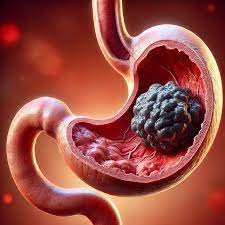
1. Endoscopy
Endoscopy is the most common method for diagnosing stomach cancer. During this procedure, a thin, flexible tube with a camera at the end (an endoscope) is inserted through the mouth to examine the lining of the stomach. If any suspicious areas are found, the doctor may take a biopsy for further examination under a microscope.
2. Imaging Tests
Imaging tests, such as X-rays, CT scans, and ultrasounds, are often used to identify the location, size, and extent of the tumor. A CT scan, in particular, is useful for detecting the spread of cancer to nearby lymph nodes and other organs.
3. Biopsy
A biopsy involves removing a small sample of tissue from the stomach for laboratory analysis. This procedure is typically done during an endoscopy, where the doctor can collect tissue from suspicious areas. The biopsy helps confirm the presence of cancer and determine its type and stage.
4. Blood Tests
Blood tests can help detect certain markers that may indicate the presence of stomach cancer. For example, elevated levels of the protein carcinoembryonic antigen (CEA) may be a sign of cancer. However, blood tests alone are not sufficient for diagnosing stomach cancer.
Treatment Options for Stomach Cancer
Treatment for stomach cancer depends on various factors, including the cancer’s stage, location, and the patient’s overall health. A combination of treatments may be used, such as surgery, chemotherapy, radiation therapy, and targeted therapies.
1. Surgery
Surgery is the most effective treatment for early-stage stomach cancer. The goal of surgery is to remove the tumor and any affected nearby tissue. In some cases, part of the stomach may need to be removed, while in more advanced cases, a total gastrectomy (removal of the entire stomach) may be required.
2. Chemotherapy
Chemotherapy is often used to treat stomach cancer that has spread to other parts of the body. It involves using drugs to kill cancer cells or stop them from growing. Chemotherapy may be administered before surgery (neoadjuvant therapy) to shrink the tumor or after surgery (adjuvant therapy) to kill any remaining cancer cells.
3. Radiation Therapy
Radiation therapy uses high-energy radiation to target and destroy cancer cells. It may be used in combination with chemotherapy to treat stomach cancer or to alleviate symptoms in advanced cases. Radiation therapy is often used for palliative care to help reduce pain and discomfort caused by the tumor.
4. Targeted Therapy and Immunotherapy
Targeted therapies work by targeting specific molecules involved in cancer growth, while immunotherapy boosts the body’s immune system to fight cancer. These therapies are relatively new but have shown promising results in treating advanced gastric cancer, especially in patients with specific genetic mutations.
Prevention of Stomach Cancer
While it is not always possible to prevent stomach cancer, certain lifestyle changes can reduce the risk of developing the disease. Here are some preventive measures:
1. Healthy Diet
Eating a diet rich in fruits, vegetables, and whole grains can help lower the risk of stomach cancer. Reducing the consumption of salty, smoked, and processed foods is also beneficial. A diet high in antioxidants and fiber may help protect the stomach lining from damage.
2. Quit Smoking and Limit Alcohol Consumption
Quitting smoking and limiting alcohol consumption can significantly reduce the risk of developing stomach cancer. Both smoking and alcohol can damage the stomach lining and increase the likelihood of cancer.
3. Treating H. pylori Infection
Eradicating H. pylori infection through antibiotics can help prevent the development of gastric cancer. If you experience symptoms such as chronic indigestion or pain, seeking medical treatment for H. pylori infection is important.
4. Regular Medical Check-Ups
Regular check-ups and screenings are important for detecting early signs of stomach cancer, especially for individuals at high risk due to family history or H. pylori infection. Early detection can improve the chances of successful treatment and survival.
Stomach cancer is a complex and often deadly disease, but with early diagnosis and appropriate treatment, survival rates can improve. By understanding the causes, symptoms, diagnostic methods, treatment options, and preventive strategies, individuals can make informed decisions about their health. Lifestyle changes, such as eating a balanced diet, avoiding tobacco and alcohol, and seeking medical treatment for H. pylori infection, can go a long way in reducing the risk of developing stomach cancer. If you or someone you know is at risk, it is essential to consult a healthcare provider for proper diagnosis and management.

